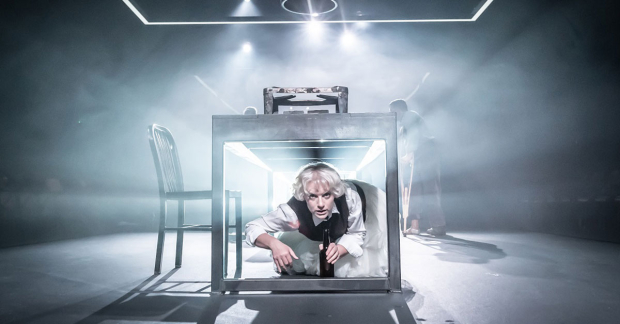Missing Julie at Theatr Clwyd – review

© Marc Brenner
There's a real sense of urgency at the end of Missing Julie, Theatr Clwyd's adaptation of Strindberg's classic play. This is because it is not just the fate of its characters that is on the line but our own too. The setting for Kaite O'Reilly's version may be a Welsh stately home at the end of The Great War but its themes of privilege, power, and possibility feel pressingly familiar. It is a time of great change where, in the fizzling interactions between heiress Julie (Heledd Gwynn) and her servant John (Tim Pritchett), we find the same sense of uncertainty, opportunity, and desire that have met us in 2020 and 2021. The old hierarchies are being shaken. Taboos are being broken. But the light of liberation shines only for a moment before it risks being snuffed out.
The bell that hangs in the centre of the stage presides ominously throughout. It casts a looming shadow over the long table that trails down the middle, flanked either side by the audience. Translucent walls act as both mirrors and screens at either end, hemming the characters in. They become trapped in this space which represents the boxes that society has placed them in. They attempt to push against these walls that surround them by dreaming, strategising, accepting, and subverting.
They argue with one another, encourage one another, challenge and rebuke one another in a fascinating struggle that involves status, identity, and drive. The tussle between John and Julie seems to lead at one point to the very real prospect of change, as they meet in the middle, and in a moment of sexual passion, the table rises, the bell along with it, to disappear into the eaves. But the music is doom-laden, expressing the reality of their situation along with the re-appearance, a moment later, of the bell, this time at one corner of the stage.
Gwynn brings an effervescent sensibility to the character of Julie, bounding onto the set at her entrance with a kind of madness that is later tempered by a more vulnerable, desperate state. Pritchett offers a caring and confident John, striding about on his crutches while belying the vitriolic side to his character with a warm personality.
Both contribute to a series of dynamic interplays wherein O'Reilly deftly handles the complexity of issues at hand. She has created dialogue that is bursting with relevance, but always overshadowed by the potent symbol of the bell. Its potential to strike at any moment poses a real threat to the liberation experienced by Julie and John on a night where social barriers have been brought down and equal opportunity has appeared tangible. Which is why, when it does finally ring, the decision they are faced with feels so pressing.
It does so too because of our own situation. The social inequalities laid bare by the pandemic are at risk of being maintained in its aftermath. Missing Julie signifies that this is a moment when we can do something about it.










